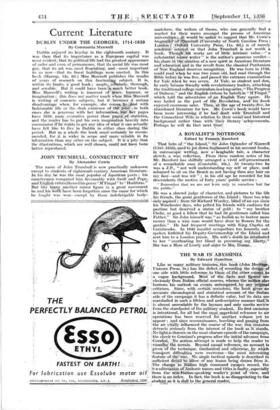JOHN TRUMBULL, CONNECTICUT WIT
By Alexander Cowie
The name of John Trumbull is now practically unknown except to students of eighteenth century. American literature., In his day, he was the most popular- of American poets ; his countrymen compared him favourably with Swift and Popp,: and Englisji critics likened his poem " M' Fingal " to " Hudibras." But like Inan,y. another minor figure in a great movement he and his liotklave been forgotten since the cause for which he fought was -won—except by those indefatigable body- snatchers, the writers of theses, who can generally find a market for their wares amongst the presses of American univers• • I.NIt would be_Ainfair:t6 suggest that Mr. Cowie's bi (University-of North Carolina Press ; Ldritliantor:ROV1 University Press, lls. 6d.) is of merely adharifile interest--or that John Trumbull is not worth a ThOTreflat works are of little intrinsic value—" a substahtialWriter " is the author's generous verdict—. his,,sharein tifp: oration of a new spirit in American literature and -edlicatiO and in the revolt from the classical Puritanism of New 'England deserves recognition. He was born in 1750, could read when he was two years old, had read through the Bible before he was five, and passed the entrance examination for Yale.,Whei lie was seven. At Yale, as student and don, he early begaine friendly with revolutionary leaders, attacking the traditional college curriculum in along satire, " The Progress of Dulness," and the English (whom he hated) in "M'Fingal," which told the adventures of tan English Tory squire. He was hailed as the poet of the Revolution, and his ',book enjoyed enormous sales. Then; at the age of twenty-fiVe, he abandoned literature for law. Mr. •Cowie's book' would have been more interesting if he had' dealt with Trumb011 and the Connecticut Wits in relation to their socialand historical background rather than with-- their literary '• achievements. Perhaps he will do that next time:












































 Previous page
Previous page